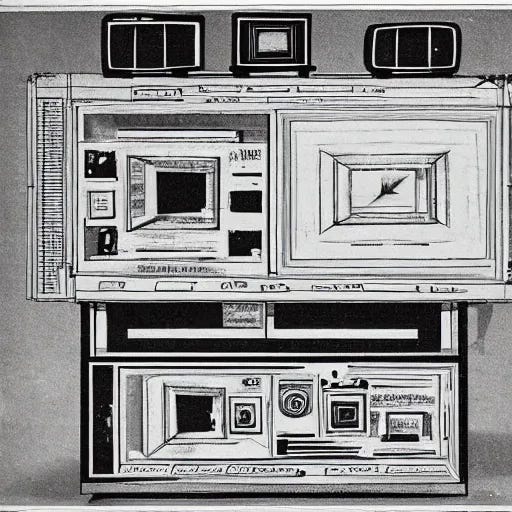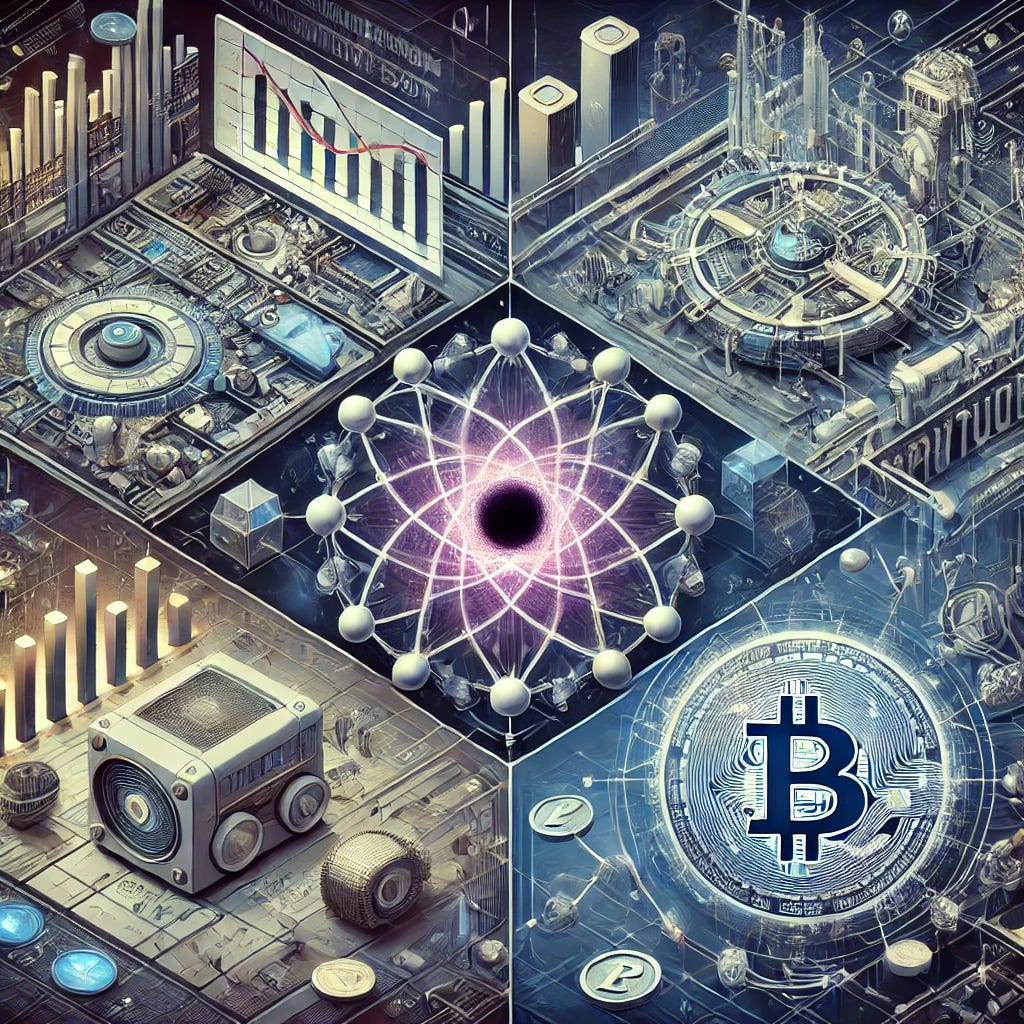To what extent has the narrative of history been shaped by the victors of wars, dictators, and monarchies?
While specific events may not repeat, the underlying patterns and themes of history often show remarkable similarities, mirroring the past.
"History doesn't repeat itself, but it often rhymes." - Mark Twain
Given how easily we get amnesia about our history, how can we figure out what really happened back then so we can better guess what might happen next?
Time Travel
Imagine a machine capable of peering into the depths of history—watching pivotal moments unfold, unaltered, as if you were there. This is the lore of the Chronovisor, a mysterious device allegedly constructed with assistance from the Catholic Church and concealed within the Vatican.
Designed to observe historical events as if traveling through time, the Chronovisor is enveloped in mystery and controversy. Whether it's real or not, the idea captivates us, especially given today's rapid technological advancements.
The Chronovisor was said to reveal hidden truths about our past, from the crucifixion of Christ to lost civilizations. Such a tool could radically shape our understanding of history and help us predict and influence the future.
While we don't have a Chronovisor today, modern developments in artificial intelligence, quantum computing, and blockchain are creating new ways to explore the past and unlock insights for the future.

Timely Truth
Time is our most valuable asset. We all have the same 24 hours in a day, often basing decisions on how we can best use that time. Whether it’s working enough hours to afford a purchase, choosing faster travel options to save time, outsourcing daily tasks, or hiring mentors & consultants to shorten our learning curve—time dictates essentially all of our choices.
Amnesia
Consider sports: the most successful athletes quickly move past mistakes. Whether it's a quarterback throwing an interception or a basketball player losing the ball, what matters is how they react, not the error itself. Adopting an 'amnesia mindset' helps them focus on the next opportunity sooner than later. This approach isn't just about forgetting—it's about learning as efficiently as possible. Often, the most successful individuals accelerate their growth by learning from others' mistakes, a practice that not only saves time but also exemplifies true wisdom.
On the flip side, amnesia can be detrimental to humanity, sowing confusion and obscuring our understanding of significant historical events. For instance, without clear historical records—which may be hidden or controlled—the mysteries of how and, more importantly, why the pyramids were built remain unsolved.
Cloud Capacity
There was a time when many of us could easily recall a long list of phone numbers, a skill rendered nearly obsolete by smartphones that keep all our contacts just a tap away. Yet, today, we hold a wealth of miscellaneous information—facts, images, and data—that people a few decades ago might have found overwhelming or even incomprehensible.
This shift in memory usage mirrors our reliance on digital storage solutions like the cloud, which allows us to store vast amounts of information cheaply and efficiently.
However, this convenience comes with risks. Just as historical libraries filled with invaluable knowledge were vulnerable to destruction by fire or theft, our modern digital repositories face similar threats.
What if the 'cloud,' our modern repository for vast amounts of information, were to be compromised, manipulated, or even collapse? The potential loss could be as devastating, if not more so, than the burning of the great Library of Alexandria, where priceless accumulations of knowledge were irretrievably lost.
This scenario not only raises critical questions about the security and durability of our digital heritage but also prompts us to consider who exactly holds the keys to this vast digital library. Just as ancient texts were once seized and secreted away in places like the Vatican Library, we must scrutinize the gatekeepers of our online repositories to ensure the protection and integrity of our collective knowledge.
Modern “Chronovisors”: The Role of Technology
1. Indicators of the Future
Algorithms and artificial intelligence are revolutionizing data analysis. For example: Algo Omega’s trading bot is a prime example, utilizing years of market data and specific indicators to spot trends and automate trades. This software design empowers even those with limited to zero trading experience to potentially earn an additional income, with monthly returns ranging from ~5% to 10%—and sometimes even more. Distinguishing features include a unique hedging strategy and a crucial stop-loss function, enhancing risk mitigation beyond what most competitors offer. We also own our software code, enabling us to provide this advanced technology at a highly competitive price.
Imagine applying this technology to unlock hidden patterns in geopolitics, societal shifts, or climate trends.
2. Quantum Computing: A Leap in Time Analysis
Think of quantum computing as the high-tech cousin of the mythical Chronovisor. It doesn’t let us view the past, but it’s phenomenal at simulating complex scenarios that could unlock secrets about the forces that have shaped our world, potentially even recreating historical events in detail.
3. Digital Assets and Blockchain: The Immutable Truth
If history has always been penned by the victors, blockchain technology could turn the tables. With its decentralized and unchangeable framework, blockchain acts as a transparent record-keeper, eliminating chances for bias or manipulation. Beyond cryptocurrencies, imagine a future where blockchain secures our current experiences as a digital “ledger of truth” for future generations to study and interpret.
4. The Power of Digital Currencies
Cryptocurrencies like Bitcoin are revolutionizing our economic landscape, much like pivotal historical events that have reshaped societies. Their decentralized nature challenges traditional systems, echoing how revolutions once transformed old monarchies into modern democracies. The rise of digital currencies illustrates the ongoing interplay between technological innovation and societal transformation, reflecting historical cycles in a modern context. Could digital currencies deter the elite from fostering chaos—chaos from which they create to benefit financially on multiple or all fronts?
Faithful Reflection: Wisdom from the Word
As we explore the mysteries of the past and the possibilities of the future, it’s comforting to ground ourselves in timeless truths. The Bible reminds us of the importance of understanding and learning from history. In Ecclesiastes 1:9, it says, “What has been will be again, what has been done will be done again; there is nothing new under the sun.” This verse speaks to the cyclical nature of life and history, encouraging us to seek wisdom from what has come before.
Just as technology and innovation drive us forward, our faith reminds us to approach these advancements with humility and discernment. God has given us the ability to create and discover, not just for personal gain but to steward these gifts for the good of others. By understanding history and embracing truth, we are better equipped to fulfill His purpose in our lives and leave a legacy that reflects His love and grace.
Stay Blessed,
Tyler Bossetti
www.tylerbossetti.com
P.S. — If you want to connect further, feel free to follow me on Instagram and send me a DM! I love connecting and chatting with you all. Your support truly means the world to me, and I look forward to hearing from you!






